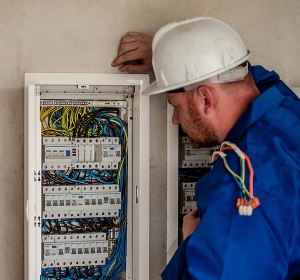To become an electrician, complete a high school diploma and enroll in an apprenticeship program. Obtain necessary licenses and certifications for your region.
Electricians play a crucial role in maintaining and installing electrical systems in homes, businesses, and industries. The profession demands a blend of technical knowledge, practical skills, and safety awareness. Aspiring electricians should start by completing a high school diploma, focusing on subjects like mathematics and physics.
Next, enrolling in a certified apprenticeship program provides hands-on experience and classroom instruction. Apprenticeships usually last four to five years and are essential for gaining the expertise needed in the field. After completing the apprenticeship, obtaining the required licenses and certifications in your region is crucial to practice legally and safely. This career offers stability and the opportunity for growth in a dynamic industry.

Credit: www.electricianclasses.com
Introduction To The Electrical Trade
The electrical trade is a vital industry. Electricians ensure that homes, businesses, and industries have power. This trade involves installing, maintaining, and repairing electrical systems. Becoming an electrician can be a rewarding career choice.
Why Choose A Career As An Electrician?
A career as an electrician offers many benefits. Here are some reasons to consider this path:
- High Demand: Electricians are always needed.
- Good Pay: Electricians earn competitive wages.
- Job Security: The trade offers stable employment.
- Hands-On Work: Enjoy practical and varied tasks.
- Career Growth: Opportunities for advancement are available.
Job Outlook And Opportunities
The job outlook for electricians is positive. According to the Bureau of Labor Statistics, the demand for electricians is expected to grow. This growth is due to new construction projects and the need to maintain older systems.
| Year | Projected Job Growth |
|---|---|
| 2020 | 8% |
| 2025 | 9% |
| 2030 | 10% |
Electricians have various opportunities. They can work in residential, commercial, or industrial settings. Some may choose to specialize in areas like electrical maintenance, construction, or renewable energy. These specializations can lead to higher pay and more job satisfaction.

Credit: intercoast.edu
Educational Requirements
Becoming an electrician starts with the right educational foundation. Understanding the educational requirements is key to your success. This section will guide you through essential courses and programs.
High School Courses
In high school, focus on math and science courses. These subjects build your problem-solving skills. Here are some recommended courses:
- Algebra – Essential for electrical calculations.
- Physics – Helps understand electrical principles.
- Shop Class – Offers hands-on experience with tools.
- Computer Science – Introduces you to digital systems.
These courses prepare you for more advanced training. They also make you a strong candidate for vocational programs.
Vocational Programs
Many schools offer vocational programs for aspiring electricians. These programs provide practical skills and knowledge. You can find them at:
- Technical high schools
- Community colleges
- Trade schools
Here are some key components of these programs:
| Component | Description |
|---|---|
| Classroom Instruction | Teaches electrical theory and safety. |
| Hands-on Training | Provides real-world experience with tools and equipment. |
| Apprenticeships | Combines work with study, often paid. |
Completing a vocational program enhances your skills. It also boosts your employability in the electrical field.
Apprenticeship Programs
Apprenticeship programs are essential for becoming a licensed electrician. These programs provide hands-on training and classroom instruction. You’ll learn the skills needed for the trade, ensuring you are job-ready upon completion.
Finding An Apprenticeship
Finding an apprenticeship is the first step to becoming an electrician. Start by checking local trade schools and technical colleges. Many offer apprenticeship programs in partnership with local businesses.
Another option is to contact local electricians or electrical contractors. They often hire apprentices directly. You can also visit job boards and websites dedicated to trade careers.
Consider joining a union. Unions such as the International Brotherhood of Electrical Workers (IBEW) often offer apprenticeship programs. These programs can provide excellent training and job placement opportunities.
What To Expect During Apprenticeship
An apprenticeship typically lasts four to five years. During this time, you will work under the supervision of a licensed electrician. Expect to spend about 2,000 hours on-the-job each year.
In addition to hands-on training, you will attend classroom instruction. This usually adds up to about 144 hours per year. Subjects covered include electrical theory, code requirements, and safety practices.
Apprentices earn a wage while learning the trade. Your pay will increase as you gain more experience and skills. Upon completing the apprenticeship, you will be prepared to take the licensing exam.
| Year | On-the-Job Hours | Classroom Hours |
|---|---|---|
| 1 | 2,000 | 144 |
| 2 | 2,000 | 144 |
| 3 | 2,000 | 144 |
| 4 | 2,000 | 144 |
Completing an apprenticeship program is a significant milestone. It marks the beginning of your career as a skilled electrician.
Certification And Licensing
Becoming an electrician requires proper certification and licensing. These credentials ensure you can work safely and legally. This section will guide you through the process of obtaining certification and licensing to become a professional electrician.
State Requirements
Each state has different requirements for electricians. Knowing your state’s guidelines is crucial.
Here’s a simple table to understand the variations:
| State | Required Hours of Training | License Exam |
|---|---|---|
| California | 8000 | Yes |
| Texas | 4000 | Yes |
| New York | 7000 | Yes |
Preparing For Certification Exams
Preparing for certification exams is essential. Here are some steps:
- Study the National Electrical Code (NEC): The NEC is the standard for electrical safety.
- Take Practice Tests: Practice tests help you understand the exam format.
- Attend Review Courses: Review courses can give you a comprehensive review.
Being well-prepared increases your chances of passing the exam on the first try. Use multiple resources to study, including textbooks and online courses. Joining a study group can also be beneficial.
Essential Skills For Electricians
Becoming an electrician requires a mix of technical and soft skills. Both skill sets are crucial for your success in this career.
Technical Skills
Technical skills are the backbone of an electrician’s career. You need to understand electrical systems deeply.
- Understanding Electrical Systems: Know how circuits, breakers, and wiring work.
- Reading Blueprints: Read and understand technical diagrams and blueprints.
- Using Tools: Use various tools like pliers, screwdrivers, and wire strippers.
- Safety Protocols: Follow safety guidelines to prevent accidents.
- Problem-Solving: Diagnose and fix electrical issues efficiently.
Soft Skills
Soft skills are equally important. They help you interact with clients and colleagues.
- Communication: Explain issues and solutions clearly to clients.
- Time Management: Complete tasks within the given timeframe.
- Attention to Detail: Be precise in your work to avoid mistakes.
- Customer Service: Handle client requests and complaints professionally.
- Teamwork: Work well with other electricians and construction professionals.

Credit: www.trade-schools.net
Specializations In The Field
Becoming an electrician offers many paths. Each path has unique challenges. Specializing can boost your skills and career. Here, we explore two common specializations.
Residential Electrician
Residential electricians work in homes. They handle wiring, lighting, and electrical systems. Their tasks include:
- Installing new wiring
- Repairing electrical issues
- Upgrading old systems
- Ensuring safety standards
They often work with homeowners. Clear communication is key. They must understand local building codes. Safety is their top priority. They often solve everyday electrical problems.
Commercial Electrician
Commercial electricians work in businesses. They manage complex electrical systems. Their work includes:
- Installing large-scale wiring
- Maintaining electrical equipment
- Ensuring systems run smoothly
- Following commercial codes
They work in offices, stores, and factories. They often handle high voltage systems. They must be detail-oriented. Their work impacts many people. Efficiency and safety are vital.
Continuing Education
Continuing education is crucial for electricians. It helps them stay current and competent. Learning never stops in this field. Electricians need to update their skills and knowledge regularly. This ensures they comply with the latest standards and practices.
Advanced Certifications
Advanced certifications improve an electrician’s career prospects. They demonstrate a higher level of expertise. Some popular certifications include:
- Master Electrician Certification: Validates extensive experience and advanced skills.
- National Electrical Code (NEC) Certification: Shows proficiency in the latest electrical codes.
- Specialty Certifications: Focuses on areas like solar power or industrial maintenance.
These certifications often require passing exams. They might also need proof of work experience. Advanced certifications can lead to higher pay and better job opportunities.
Staying Updated With Industry Trends
Staying updated with industry trends is essential. The electrical field is always evolving. New technologies and methods emerge frequently. Electricians should keep an eye on these changes to remain effective.
Here are some ways to stay updated:
- Attend industry conferences and workshops.
- Subscribe to trade magazines and journals.
- Join professional associations and networks.
- Take online courses and webinars.
These activities help electricians learn about new tools and techniques. They also provide opportunities for networking and professional growth.
Building A Successful Career
Becoming an electrician is a rewarding journey. With the right steps, you can build a successful career. This guide will help you navigate key aspects such as networking and job search strategies.
Networking Tips
Networking is crucial for electricians. Here are some tips to help you:
- Join Professional Associations: Organizations like the National Electrical Contractors Association (NECA) offer resources.
- Attend Industry Events: Conferences and trade shows are great for meeting peers.
- Utilize Social Media: Platforms like LinkedIn can connect you with industry professionals.
Job Search Strategies
Finding the right job requires a strategic approach. Here are some effective methods:
- Update Your Resume: Highlight your skills and certifications.
- Use Job Boards: Websites like Indeed and Monster list electrician jobs.
- Contact Local Contractors: Reach out to companies directly for openings.
- Leverage Apprenticeships: These programs often lead to full-time positions.
By following these strategies, you can build a successful career as an electrician.
Frequently Asked Questions
How Long Is Electrician School In Texas?
Electrician school in Texas typically lasts 9 months to 2 years, depending on the program and certification level.
Is Being An Electricians Hard?
Being an electrician can be challenging. It requires technical skills, physical stamina, and attention to detail.
What Type Of Electrician Makes The Most Money?
Industrial electricians typically earn the most money. They work in factories, plants, and mines, handling complex systems and machinery.
How Long Is Electrician Apprenticeship In Texas?
An electrician apprenticeship in Texas typically lasts four to five years. This includes on-the-job training and classroom instruction.
Conclusion
Becoming an electrician is a rewarding career choice. It requires dedication, training, and hands-on experience. Follow the steps outlined to start your journey. Gain certifications and continuous learning to stay updated. With hard work and passion, you can build a successful and fulfilling career as an electrician.





